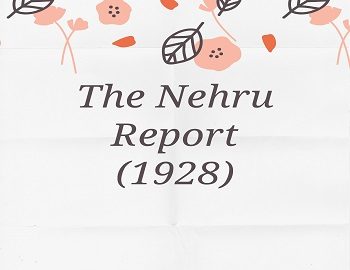The Nehru Report (1928):
To justify the exclusion of Indians from the Simon Commission the British cited the lack of unity among the Indians. Lord Birkenhead, the Secretary of State in 1927, had expressed his doubts about the ability of the Indians to draft a constitution to which all parties and communities would agree. Indians now seemed to be determined to counter-challenge Birkenhead’s assumption. All important Indian leaders met in 1928 first in Delhi and then at Poona to draw up the agreed constitution for India. The conference set up a subcommittee led by Motilal Nehru for the purpose. Besides Nehru, the committee included leaders like Ali Imam, Suhaib Qureshi, Subhas Chandra Bose, N.M.Joshi and Tejbahadur Sapru etc. The report, submitted by the sub-committee was known as the Nehru Report (August 10, 1928).
Important Recommendations of Nehru Report:
- Attainment of Dominion Status to India at an early date. It meant independence within the framework of the British Commonwealth.
- Safeguarding the interests of the religious minorities and also providing for full protection.
- Declaration of Rights, including an equal right for women, the right to form unions, and universal adult suffrage. In all nineteen fundamental rights were recommended.
- India would be a Federation, having a bicameral Legislature at the Centre to which the Ministry would be responsible.
- The Governor-General would be only the constitutional head with the same powers as the British Crown.
- There was to be no separate electorate.
- An independent judiciary with a Supreme Court at its head.
The Nehru Report was approved by Congress at the Calcutta session in December 1928. The All Party Convention of Calcutta in December 1928, however, failed to pass the NehruReport due to the objections raised by the separatist leaders of the Muslim League, the Sikh League and the Hindu Mahasabha. In the Calcutta session of the Congress (1928) Subhas Chandra Bose and Jawaharlal Nehru strongly advocated the demand for complete independence or Poorna Swaraj. However, eventually, Gandhi was successful in effecting a compromise and decided that Congress would resort to mass non-cooperation and demand complete independence if the British refused to implement Dominion Status within a period of one year.









Comments (No)